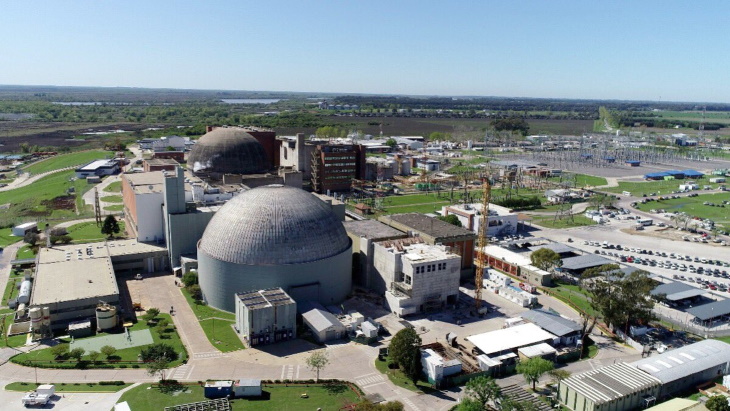
The Atucha plant site (Image: Nucleoelectrica Argentina)
The reactor has been closed since October 2022 when a routine inspection "detected that one of the four internal supports of the reactor had detached and moved from its design location". Operator Nucleoelectrica Argentina (NA-SA) said that it is a "mechanical failure of the plant" but does not present a risk to the safety of people of the environment.
In a progress update the company said that a diagnosis of the failure was made by mechanical and hydraulic studies and "it was decided to extract the part and work began on the use of state-of-the-art engineering methods for the implementation of robotic and technological tools that allow optimising repair times, in order to return to service as soon as possible".
The detached separator is 14 metres deep inside the reactor so tools needed to be designed to adapt to those conditions, including a cutting tool, holding tool, gripper, a basket within which to extract the piece as well as lighting and vision tools to monitor the manoeuvre. "It was also necessary to develop a pressure welding tool and method to preventatively weld the three remaining spacers that did not come off," said NA-SA.
To practice the cutting and extraction manoeuvres and test the tools a full scale model of the reactor sector was designed - "the container used in the repair of the Atucha 1 Nuclear Power Plant in 1988 was reconditioned ... all the internal elements were manufactured on a 1:1 scale and placed inside this chamber".
Argentina's Nuclear Regulatory Authority is currently reviewing the plan for the repair, which was submitted earlier this month. Its technical personnel have also been inspecting the work in the test facility "to validate the proposed method and the development of implementation procedures ... to verify compliance with nuclear and radiological safety premises". Nucleoelectrica Argentina is hoping to be able to begin the work in June.
Argentina's nuclear sector has three pressurised heavy water reactors with a total generating capacity of 1641 MWe across the Atucha 1, Atucha 2 and Embalse power plants. Atucha II's first grid connection was in 2014 - construction began in 1981 as a joint venture of CNEA and Siemens-Kraftwerk Union but work was suspended in 1994 with the plant 81% complete. It was restarted in 2006, entering commercial operation in May 2016.